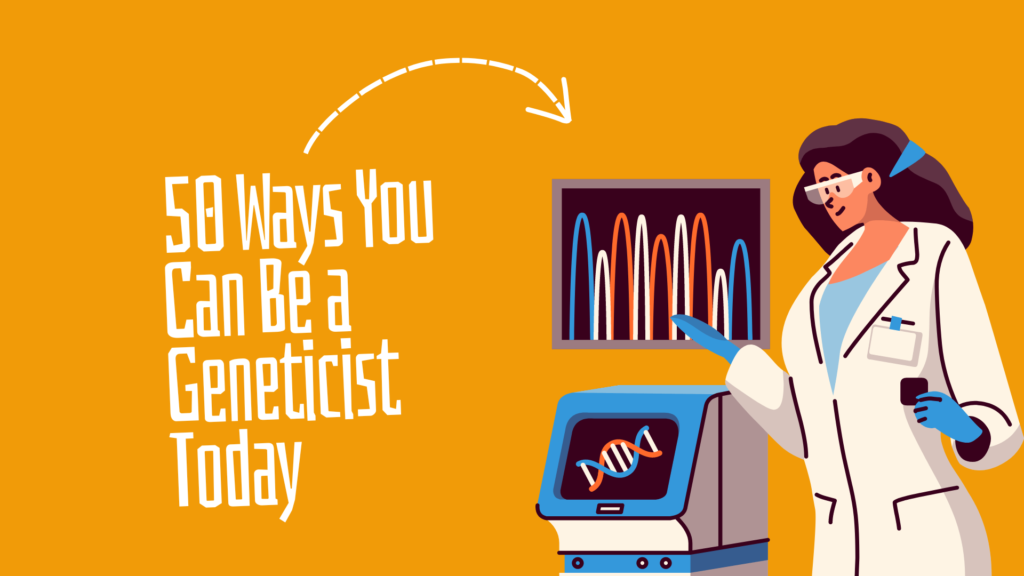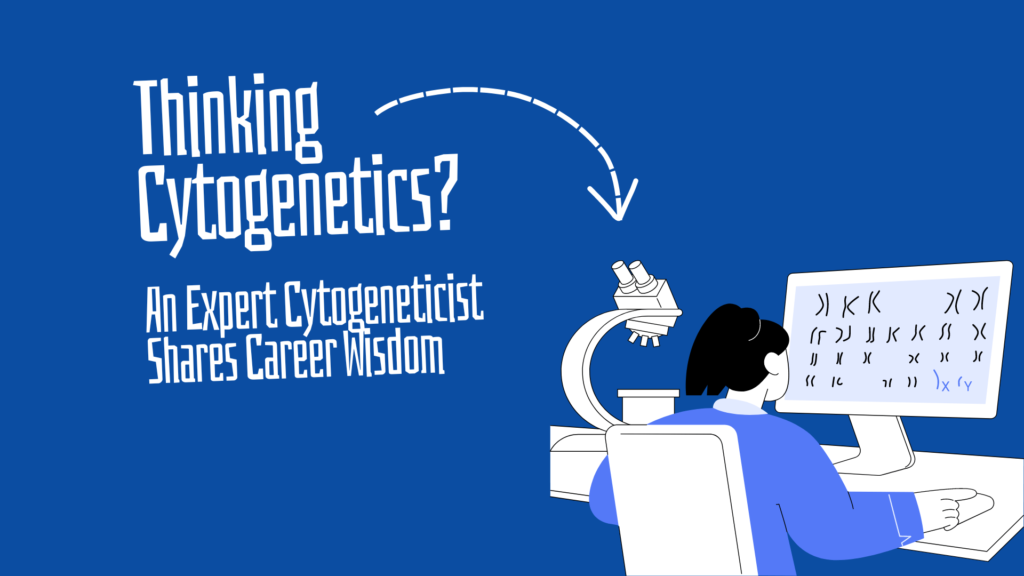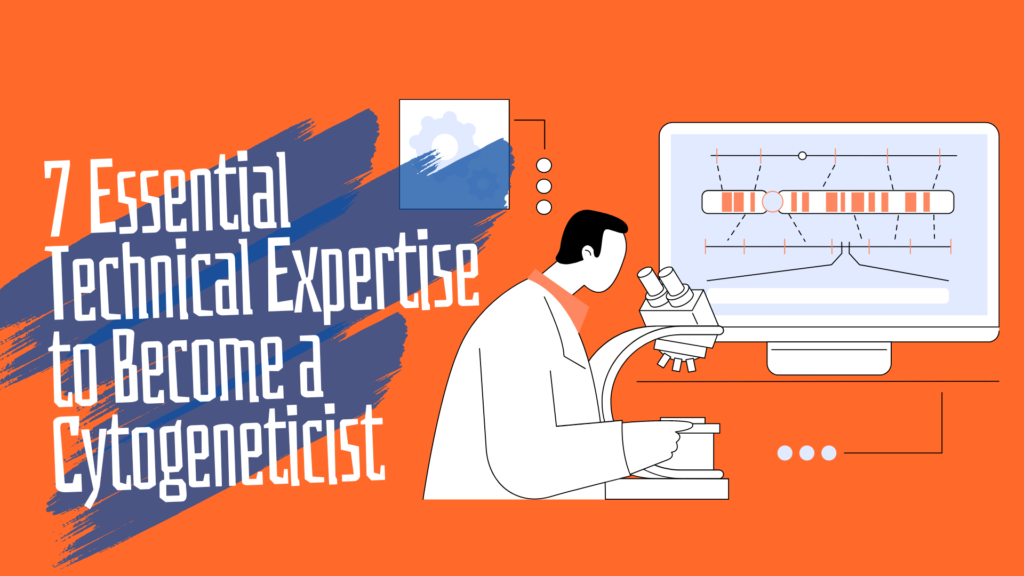Genetics is a super interesting discipline because it looks at the tiniest parts of life, like DNA, RNA, chromosomes, genes, and genomes. It’s like exploring the small building blocks that make us who we are.
If you’re studying genetics or anything related to life science and want to keep going in this field but feel a bit lost, don’t worry. This article is here to help! I’m going to explain 50 different ways you can be a geneticist.
Think of it as 50 different types of geneticists. Whether you’re already an expert or just starting, these options will give you ideas about where to take your interest in genetics.
I’m a geneticist and worked in various industries, and trust me it holds infinite potential and a bright future. This article is one step toward your future and helps me make up my mind regarding which direction you can hunt!
This article is going to be super useful to you.
Stay tuned.
Related article: 30 Branches of Genetics You Should Know.

50 Types of Geneticists:
- Geneticist:
Study classical genetic theories like inheritance of traits, variations, genomes and roles of genes in health and diseases. A geneticist having a sheer and pure knowledge of genetics can share their career in any direction; starting from plant to animal genetics or microbial to human genetics.
No additional knowledge of any other discipline is required.
- Human Geneticist:
Focuses specifically on the study of human genetics, including diseases, traits, and population genetics. Additional knowledge of various clinical conditions should be required.
- Genetic Counselor:
Works with individuals and families to assess the risk of genetic disorders and provides information and support for making informed decisions about healthcare.
Genetic counseling is the most popular and growing genetic field. No additional knowledge of any other discipline is required. However, clinical knowledge of disease and genetic tests must be needed.
- Clinical Geneticist:
Specializes in the diagnosis and management of genetic disorders in a clinical setting. Their role is to perform, set up, standardize, understand and read DNA and various other genetic tests.
No additional knowledge of any other discipline is required.
- Research Scientist (Genetics):
Engages in laboratory research to investigate genetic mechanisms, functions, and implications. Additional knowledge of wet and dry lab work is required. Also requires skills like research design, setup, and validation, data analysis, processing, and interpretation.
No additional knowledge of any other discipline is required.
- Molecular Biologist:
Studies biological processes at the molecular level, including the structure and function of DNA, RNA, and proteins. Also studies the genetic basis of various disorders. Additional clinical or disease knowledge is needed.
- Genetic Epidemiologist:
Investigates the role of genetics in the occurrence of diseases within populations. Additional knowledge of population study and epidemiology is needed.
- Genetic Data Scientist:
Analyzes and interprets large-scale genetics and genomic data using computational tools and statistical methods. Additional knowledge of computer science, statistics and other information technology is required.
- Bioinformatician:
Applies computational techniques to analyze biological data, including genomic sequences and protein structures.
- Cytogeneticist:
Examines chromosomes to identify abnormalities or disorders related to chromosomal structure. Additional knowledge of cell and tissue culture is required, as the field highly relies on this.
Read more: A Brief Introduction To Cytogenetics [Karyotyping, FISH and Microarray]
- Immunogeneticist:
Studies the genetic basis of the immune system’s function and its role in diseases, for example— genetic basis of autoimmune diseases. Additional knowledge of immunology is required.
- Pharmacogeneticist:
Investigate how genetic variations influence responses to drugs and design personalized treatment plans. Additional knowledge of pharmacy is required.
- Forensic Geneticist:
Applies genetic techniques to analyze DNA evidence in forensic investigations. Should have additional knowledge of criminology and law.
- Genetic Engineer:
Modifies genes for specific purposes, such as creating genetically modified organisms (GMOs) or developing gene therapies. No additional knowledge of any other discipline is required.
Read more: Genetic Engineering: Importance and Educational Requirements.
- Genomic Medicine Specialist:
Integrates genomic information into medical practice for personalized patient care. Additional healthcare and patient care knowledge is needed.
- Computational Biologist (Genomics):
Utilizes computational methods to analyze biological data, with a focus on genomics. Should have additional knowledge of bioinformatics.
- Population Geneticist:
Studies genetic variation within and between populations to understand evolutionary processes. Should have additional knowledge of statistics.
- Cancer Genetic Counselor:
Specializes in assessing and counseling individuals with a family history of cancer. A cancer genetic counselor is the most recently evolved stream and holds a bright future. Their role is to educate patients or families regarding cancer and its consequences.
Read more: A Brief Introduction To Cancer Genetics.
- Nutrigeneticist:
Investigates how genetics influences individual responses to diet and nutritional factors. Additional knowledge of nutrition is required.
- Genomic Data Analyst:
Analyzes and interprets genomic data to extract meaningful insights. Genomic data analyst is a specialized field, one has to have experience and expertise with genomic data analysis.
- Pediatric Geneticist:
Focuses on genetic issues affecting children and infants. Additional knowledge of child health, congenital disorders and pediatrics is needed.
- Veterinary Geneticist:
Applies genetic principles to the breeding and health of animals. Additional knowledge of veterinary practice is needed.
- Agricultural Geneticist:
Works on improving crops and livestock through genetic modification and selective breeding. Additional knowledge of agriculture, plant breeding and tissue culture is needed.
- Epigeneticist:
Studies changes in gene expression caused by various intrinsic and extrinsic factors other than alterations in the DNA sequence. No additional knowledge of any other discipline is required.
- Genomic Ethicist:
Examines the ethical implications of genetic research and technology.
- Genetic Test Developer:
Designs and develops genetic tests for various purposes, including diagnostics and screening.
- Genomic/Genetics Education Specialist:
Educates healthcare professionals and the public about genetics and genomics. Genetics educational specialist is yet another emerging option, as every medical professional, now requires the knowledge of genetics.
- Genetic Regulatory Affairs Specialist:
Ensures that every genetic or genomic test or company should have compliance with regulations and ethical standards in genomic research.
- Genetic Biotechnologist:
Applies biotechnological techniques to genomic research and applications. Additional knowledge of biotechnology is required.
- Genetic Pathologist:
Examines tissue samples to diagnose diseases based on genetic markers. Additional knowledge of pathology is required.
- Genetic Laboratory Technologist:
Conducts laboratory tests to analyze genetic material. No additional knowledge of any other discipline is required. GLTs are just like clinical geneticists but work on a lower grade.
- Genetic Information Specialist:
Manages and interprets genetic data, providing information to healthcare professionals. Additional knowledge of statistics, information technology and data analysis is required.
- Genomic Policy Analyst:
Analyzes and contributes to the development of policies related to genetics or genomics. Additional knowledge of policymaking is needed.
- Genetic Patent Analyst:
Evaluates and assists in obtaining patents for genetic inventions. Additional knowledge of patenting and IPRs (Intellectual Property Rights) is required.
- Clinical Embryologist:
Works with reproductive technologies, including in vitro fertilization and genetic screening. Additional knowledge of embryology is required.
- Genetic Anthropologist:
Studies the role of genetics in human evolution, migration, and diversity. Additional knowledge of anthropology is required.
- Genetic Archaeologist:
Applies genetic techniques and techniques to study ancient human populations. Additional knowledge of archaeology is required.
- Genetic Engineering Technician:
Assists in laboratory procedures related to genetic engineering. The post is similar to a genetic laboratory technician.
- Genetic Quality Assurance Specialist:
Ensures the accuracy and reliability of genetic testing procedures. Should have additional knowledge of quality assessment and assurance.
- Ecological Geneticist:
Investigates the role of genetics in ecological processes, such as adaptation and population dynamics in natural environments. Additional knowledge of ecology is required.
- Behavioral Geneticist:
Studies the genetic basis of behavior, including the influence of genes on traits and predispositions. Additional knowledge of psychology is required.
- Genetic/Genomic Data Visualization Specialist:
Creates visual representations of genomic data to aid in the interpretation and communication of complex genetic information. Should have additional knowledge of data presentation.
- Translational Genomic Scientist:
Focuses on translating genomic research findings into practical applications for clinical use.
- Evolutionary Geneticist:
Studies the genetic basis of evolution, including the molecular changes that drive species divergence. Should have additional knowledge of evolution science.
- Neurogeneticist:
Investigates the genetic basis of neurological disorders and the molecular basis of brain function. Sheer knowledge of neurology is required.
- Genetics Bioethicist:
Examines ethical issues related to genomic research, technology, and applications. Additional knowledge of bioethics is required.
- Genetic Conservationist:
Applies genetic principles to the conservation of endangered species and biodiversity. Additional knowledge of conservation science is required.
- Reproductive geneticist:
Studies genetic basis of reproductive health and individual’s reproductive status. Additional knowledge of reproductive science is required.
- Microbial geneticist:
Studies genetics of microbes and their role in various conditions, diseases, ecology, etc. additional knowledge of microbes is required.
Read more: Why Microbial Genetics Is The Future of Microbiology? Comparison and Applications.
- Marine geneticist:
Studies the genetics of marine life and their interactions and role in marine ecosystems. Should require additional knowledge of marine biology.
Wrapping up:
In conclusion, if you are studying genetics and have an interest in this field, whatever field you are in! Your future is bright. Take an interest in genetics and work for the betterment of mankind.
I hope this article will add value to your career. Please share this article with your group.

